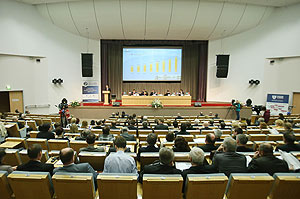Ru
|
Eng
Expert: IT has a great impact on education quality
08.04.2014

Information technologies play an important role in the quality of education of higher learning institutions, Deputy Rector for Education and Informatization of the Belarusian State University of Informatics and Radioelectronics (BSUIR) Boris Nikulshin said as he spoke at the international education forum European Quality Education (EQE Forum) that started in Minsk on 8 April, BelTA has learnt.
According to Boris Nikulshin, information technologies are viewed by the BSUIR as a key development factor. The university has developed many solutions; the most relevant of them include information technologies in distance learning, cloud technologies and automated systems of submitting applications and enrolment.
Distance learning embodied the principle “Knowledge delivered to people”. It is based on using modern information and communication technologies, a dialogue between teachers and students, individual learning plans with an opportunity to choose disciplines. The availability of the necessary software and hardware enabled the university to get permission from the Education Ministry to certify all disciplines of the 2012/2013 curriculum, including the curriculum for students with disabilities. The BSUIR has plans to enroll college graduates to 4-year or 3.5-year courses.
Boris Nikulshin emphasized the importance of using distance learning solutions in studying individual disciplines. Any person can study one or several disciplines distantly and get a certificate that is recognized by the university and, upon agreement, by other universities.
Boris Nikulshin spoke about the use of the BSUIR’s distance learning system in other countries, for example the United States. Together with the Computer Systems Institute (Chicago, U.S.), the BSUIR offers additional distance learning courses. The graduates will get the BSUIR certificates.
Another remarkable IT trend that has emerged in recent years is the development of cloud technologies. Instead of selling software, developers prefer to make it available on subscription. Traditional classrooms cannot be used to train modern-day IT specialists. More than that, it is too costly to support traditional computer classrooms as they get antiquated very fast. This problem can be resolved by using cloud technologies. “The advantages of these technologies are obvious: users order the necessary hardware and pay only for hosting. Educators will not have to bother about upgrade, maintenance and licensing. An additional advantage is a possibility of mobile interactive communication between users, which allows teaching users who are located far from one another,” Boris Nikulshin said.
He believes that the establishment of the data processing center by the Education Ministry will allow diversifying the software used for educational and administrative purposes. “Given this huge amount of information coming from universities, vocational training colleges and other educational institutions, the ministry is not able to get summary information about a particular topic,” the BSUIR Deputy Rector said.
According to Boris Nikulshin, information technologies are viewed by the BSUIR as a key development factor. The university has developed many solutions; the most relevant of them include information technologies in distance learning, cloud technologies and automated systems of submitting applications and enrolment.
Distance learning embodied the principle “Knowledge delivered to people”. It is based on using modern information and communication technologies, a dialogue between teachers and students, individual learning plans with an opportunity to choose disciplines. The availability of the necessary software and hardware enabled the university to get permission from the Education Ministry to certify all disciplines of the 2012/2013 curriculum, including the curriculum for students with disabilities. The BSUIR has plans to enroll college graduates to 4-year or 3.5-year courses.
Boris Nikulshin emphasized the importance of using distance learning solutions in studying individual disciplines. Any person can study one or several disciplines distantly and get a certificate that is recognized by the university and, upon agreement, by other universities.
Boris Nikulshin spoke about the use of the BSUIR’s distance learning system in other countries, for example the United States. Together with the Computer Systems Institute (Chicago, U.S.), the BSUIR offers additional distance learning courses. The graduates will get the BSUIR certificates.
Another remarkable IT trend that has emerged in recent years is the development of cloud technologies. Instead of selling software, developers prefer to make it available on subscription. Traditional classrooms cannot be used to train modern-day IT specialists. More than that, it is too costly to support traditional computer classrooms as they get antiquated very fast. This problem can be resolved by using cloud technologies. “The advantages of these technologies are obvious: users order the necessary hardware and pay only for hosting. Educators will not have to bother about upgrade, maintenance and licensing. An additional advantage is a possibility of mobile interactive communication between users, which allows teaching users who are located far from one another,” Boris Nikulshin said.
He believes that the establishment of the data processing center by the Education Ministry will allow diversifying the software used for educational and administrative purposes. “Given this huge amount of information coming from universities, vocational training colleges and other educational institutions, the ministry is not able to get summary information about a particular topic,” the BSUIR Deputy Rector said.
SCIENCE. TECHNOLOGY. INNOVATIONS
13.08.2024
28.06.2024
28.06.2024
25.06.2024
05.06.2024
15.05.2024
15.05.2024
26.04.2024
26.04.2024
26.04.2024













